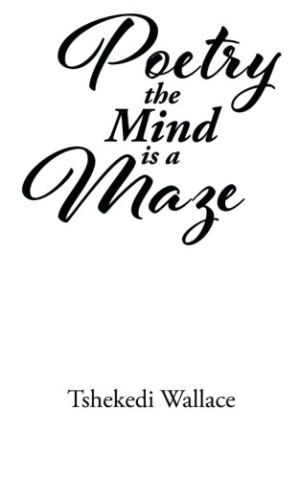
Poetry the Mind is a Maze
This poetry collection is a life-soaked, terrifying journey into a troubled man’s world.
Tshekedi Wallace’s Poetry the Mind is a Maze is a brief volume of honest reflections that seems to occupy a spiritual space between lost innocence and purgatory.
From its near beatification of popular-culture celebrities like Jennifer Lopez to dark revelations through bloody acts of gang violence, this is a collection of thoughts running over each other without resolution or reason. But its poems move from the depravity of careless and dark revenge to redemptive moments of fatherhood and forgiveness, and do so with admirable sincerity.
The collection is presented without a foreword or information about the author, so the poems progress without a foundation of context, and without predisposing the audience to either pity or judge the narrator; this inhibits access to quick empathy. Complete impressions come from the poetry alone. There is a feigned formality to some of the language, and reliance on easy rhyme schemes:
America you pretty star, the best power and treasure is what you are
Your talent is like the guiding star, I will follow to the end sweetheart
Such approaches feel forced, almost as if the poet is actually wearing a poet’s mask. These impressions do, however, make an interesting counterpoint to the other masks that the poet is shown to have worn—those of thug, hustler, con man, murderer, husband, lover, and father.
Many of the collection’s poems are difficult to read. Shocked and desperate descriptions of gang murders and the feeling of “the evil blood of 1000 un-dead hell torn souls” coursing through the poet’s veins are provocative and graphic. But glimmers of hope in a dark world come through in lines like these:
Not one other to see the truth with you, or to see your thoughts
No liking of your own world, you can create another
Lonely nights for you will never be like the crowded days
What comes to light through this collection is a portrait of a man torn between good and evil, and ultimately wanting to be able to forgive himself. Discussions of atonement come up, as well as mentions of demonic possessions and angelic visitations. This imagery sometimes seems clichéd, but also makes for powerful moments, as in a poem about not being invited into heaven: “Bring hell, beg, lose breath, hate, enter with no wings and no / light left.”
This collection offers insights into the struggles of a life lived in the self-described “hood” or “ghetto,” not often written about in such an untechnical and unfiltered way. This volume is a life-soaked, terrifying journey into a troubled man’s world.
Reviewed by
Sara Budzik
Disclosure: This article is not an endorsement, but a review. The publisher of this book provided free copies of the book and paid a small fee to have their book reviewed by a professional reviewer. Foreword Reviews and Clarion Reviews make no guarantee that the publisher will receive a positive review. Foreword Magazine, Inc. is disclosing this in accordance with the Federal Trade Commission’s 16 CFR, Part 255.
